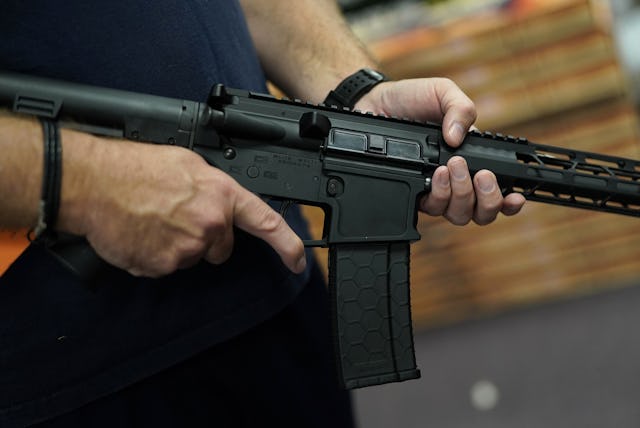A Congressman Wants To Slap A 1,000% Tax On AR-15s
The bill would offer a creative way to keep semiautomatic weapons out of the hands of much of the population.

The country is currently mourning another devastating string of mass shootings, including the horrific murder of school children and their teachers in Uvalde, Texas, in May. And yet federal politicians seem to be deadlocked, Democrats against Republicans, when it comes to doing anything about gun safety and gun control.
Now, one House Democrat is drafting a bill that would offer a more creative solution that could find more support. Rep. Don Beyer of Virginia is suggesting that instead of an all-out ban on semiautomatic guns like AR-15s, we could heavily tax the firearms so that most people couldn’t easy afford or access them.
Specifically, Beyer is writing a bill that would place a 1,000% excise tax on the weapons — which would raise their price from somewhere around $500 to $2000 to $5,000 to $20,000.
"What it's intended to do is provide another creative pathway to actually make some sensible gun control happen," Beyer told Business Insider. "We think that a 1,000% fee on assault weapons is just the kind of restrictive measure that creates enough fiscal impact to qualify for reconciliation."
Both the Uvalde shooter and the Buffalo shooter legally bought AR-15s before their crimes — and both were just 18 years old. Beyer believes that neither purchase could have happened if the teens had to cough up more cash.
The bill isn’t in a final draft, so a number of questions remain, such as when the tax would go into effect and where the tax money would go.
The military and police forces wouldn’t be subject to the tax. And it wouldn’t apply to the estimated 20 million AR-15s already in circulation in the United States. But taxing the 10-bullet magazines that the guns use could also help curb the guns’ popularity and usage.
While some believe the law would have a better chance of getting passed in the Senate, where gun control bills passed by the House go to stagnate due to a filibuster, others say it would further position the Dems as tax-happy.
Excise taxes, also called consumption taxes, are in place for other products that the government wishes to discourage, including alcohol, cigarettes, and gambling — though there’s not much research on whether a high tax on guns would translate to lower crime rates.
On Thursday, the House passed even more restricted gun bills after hearing heartbreaking testimony from survivors of mass shootings and from the relatives of victims. The bills would raise the age to purchase semiautomatic rifles to 21, require safe firearms storage, and crack down on illicit firearm trafficking. Five Republicans crossed the aisle to vote for the measure, which is called the Protecting Our Kids Act — but the future of the act in the Senate is not bright.
"Who will be able to tell their constituents that they stood with them and not with the gun lobby?" said Representative Jerry Nadler. "Americans are watching. They are begging us to protect them and their loved ones from gun violence, who among us will answer their call?"